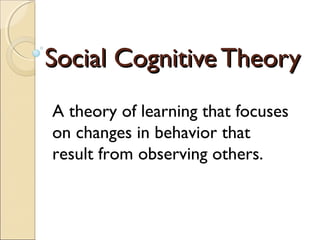
Social cognitive theory
- 1. Social Cognitive TheorySocial Cognitive Theory A theory of learning that focuses on changes in behavior that result from observing others.
- 2. The role of expectationThe role of expectation Believe that reinforcement and punishers create expectations that in turn influence behavior. People respond to their expectation means they are aware of which behavior will be reinforced or punished. As teacher, we must clearly specify the behavior you will reinforce and provide students with clear feedback so they know what behavior have been reinforced.
- 3. Reciprocal causationReciprocal causation Behavior, the environment, and personal factors, such as expectations, are interdependent. Each influences the other two.
- 4. ModelingModeling Behavior, cognitive, and affective changes deriving from observing one or more models. Teachers play a very important role in demonstrating skills and displaying courtesy and respect for others, tolerance for dissenting opinions, motivation to learn, and other attitudes and values.
- 5. Andy’s case studyAndy’s case study Ms Wong does not demonstrate the right skills: critical thinking skills, study strategies. Ms Wong does not display respect to Andy and does not motivate him to study.
- 6. Cognitive ModelingCognitive Modeling The process of incorporating demonstrations together with verbalization of model’s thoughts and reasons for performing the given actions. Learners benefit from the thinking of experts.
- 7. Andy’s case studyAndy’s case study Ms Wong does not put her thinking into words and does not encourage students to share their thoughts. No specific, concrete examples of how to think about and solve problems. No demonstration in thought process, students cannot think critically when sitting for tests and exams. Only have factual knowledge.
- 8. Vicarious learningVicarious learning The process of people observing the consequences of other’s actions and adjusting their own behavior accordingly.
- 9. Nonoccurrence of expectedNonoccurrence of expected consequencesconsequences Bee Chu was not reprimanded for laughing at Andy. This act as a reinforcement to Bee Chu, and she will continue to laugh at Andy. Andy studied for the science test, but his effort was not recognized. In fact Ms Wong scolded him for not doing well. nonoccurrence of reinforcement act as punisher. Andy is less likely to work hard in the future.
- 10. Function of modelingFunction of modeling Learning new behaviors Facilitating existing behaviors Changing inhibitions Arousing emotions
- 11. Processes involved in learning fromProcesses involved in learning from modelsmodels Attention: a learner’s attention is drawn to the critical aspects of the modeled behavior. Retention: the modeled behaviors are transferred to memory by mentally verbalizing or visually representing them.
- 12. Processes involved in learning fromProcesses involved in learning from modelsmodels Reproduction: learners reproduce the behaviors that have been stored in memory. Motivation: learners are motivated by the expectation of reinforcement for reproducing the modeled behaviors.
- 13. Self-regulationSelf-regulation The process of accepting responsibility for and taking control of one’s own learning. Includes: setting goals, monitoring progress, self-assessment and self- reinforcement.
- 14. Andy’s case studyAndy’s case study Andy can set achievable goals that focus in helping him to increase in skills and abilities. Monitor his progress Self-assess Self-reinforcement: reward himself when he achieve his goals.
- 15. 4 Processes involved in learning4 Processes involved in learning from modelsfrom models Attention: observe critical aspects of model’s behavior Retention: transfer information to memory Reproduction: imitate model’s behavior Motivation: learners are motivated by the expectation of reinforcement for producing the modeled behaviours.